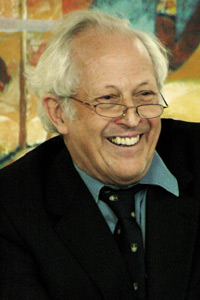

George Ellis
In the latest poll of our Science fiction, science fact project you told us that you wanted to know whether there is such a thing as free will. In the article Physics and freedom we explored determinism and the impact of quantum mechanics on the free will debate. But if there is such a thing as free will, where does it come from and how can it possibly have an impact on the physical world? George Ellis, a cosmologist and mathematician at the University of Cape Town, is working on ideas he thinks shed some light on these questions. We went to see him to find out more. Click here to see more articles on free will.
Taking things apart...
A reductionist view of science, endemic with many physicists, is that every system is no more than the sum of its parts. To understand it, take it apart and the answer will be there in the interactions of the smallest constituents. This works well for things like toasters, say. If it's not working, you open it up and see what's gone wrong. But the idea is that it's also true for complex organisms like ourselves.
Francis Crick, co-discoverer of DNA, put this idea most succinctly: "You, your joys and your sorrows, your memories and your ambitions, your sense of personal identity and free will, are in fact no more than the behaviour of a vast assembly of nerve cells and their associated molecules." And since molecules are made up of atoms, which are made up of electrons and protons, and so on, this means we're all dancing to the tune of whatever lies at the very bottom level of physics. No chance for human will to intervene.
...and putting them back together again
The reductionist approach has been hugely successful and we owe it much of our understanding of the world. But Ellis thinks that it's only the bottom of the iceberg, so to speak, and neglects some crucial features of reality. The key idea here is emergence. "If you take a set of parts and put them together in an appropriately cunning way, then they start to make higher level entities with properties that are completely unlike the properties of the parts," he says. "These are emergent properties."
Nature provides many examples of emergence. A popular one is the exquisitely choreographed motion of shoals of fish or flocks of birds — see the movie below. There is no leader and no master plan: the mesmerising complexity is a result of individual animals behaving according to a set of simple rules, for example "do whatever your nearest neighbour does". A simple computer programme is enough to simulate it (see the Plus article The matrix: Simulating the world).
Another example comes from physics. A gas has properties such as pressure, temperature and density, which aren't present in its individual atoms. Indeed, the laws that describe how these properties relate to each other make no mention of atoms at all. Even if you'd never heard of these tiny components, you could use the laws to reliably predict how a gas will behave.
A flock of starlings getting ready to roost.
Fascinating as they are, you might argue that these examples are not particularly mysterious. The emergent phenomena of the whole are simply a result of the aggregate behaviour of many parts. But things get more interesting when you leave the realm of the purely physical.
Take money, for example. Its value has nothing to do with the physical properties of coins, banknotes or the computer that holds our account details. "A physicist can analyse the paper or the ink [on a banknote] but this tells us absolutely nothing about the causal power of money," says Ellis.
Neither can you reduce money to the neurological level. In someone's brain the idea of money may be created by neurons behaving in a particular way. But Ellis points out that money transcends the individual. Its value derives from a social agreement involving millions of people. You cannot reduce money to an individual's brain state. To fully comprehend it and the economical mechanisms through which it functions, you need to go beyond the physical.
Ellis talks about a hierarchy of complexity. At the bottom level there's the physics of the smallest scales (which we don't yet understand properly), then there's particle physics, a level up there's nuclear physics, then you get chemistry and so on, all the way up to psychology. At the very top there's a level encompassing sociology, politics and economics, and here's where the concept of money resides.
Each level is made up of lower level components, but it's more than just an aggregation of parts. "At each level you get emergent laws which cannot be described in the language you use at the lower levels," he says. "One of the amazing things is that the higher levels are almost independent of the lower levels. A motor mechanic does not need to know quantum physics [to do the job] and a neurosurgeon does not need to know atomic physics."
Chasing the ghost from the machine
It's conceivable that human consciousness is an emergent phenomenon that lies at a higher level of the hierarchy. But to exercise free will, you need to be able to cause physical change in the world. There's no point in deciding you want a cup of coffee if you can't then make your hand pick it up. It's clear that processes at a lower level of the hierarchy affect the level above: if the atoms in a gas move faster, its temperature goes up. But how can higher, non-physical agencies influence what happens at lower levels? Can we explain this without invoking a ghost in the machine?
Ellis thinks we can and points to a mechanism called top-down causation. The idea is that while higher-level functions cannot violate the laws of physics, they can channel and guide lower level processes to effect change. "The physics gives you a possibility space which restricts what you can do, but you choose what happens in that possibility space," he explains. And he suggests that top-down causation is at work everywhere in the world around us. Once you start looking, you see it all over the place.

Natural selection has produced an amazing range of species.
One example is Darwinian natural selection. Random mutations in genes lead to individuals with different characteristics, some of whom pass on their genes more successfully than others. Ultimately you get individuals perfectly suited to their particular niche in the world. It's top-down action from the environment to the level of genes: if the environment were different a different set of genes would become dominant. Ellis calls this type of top-down causation adaptive selection. (In total Ellis has identified five ways in which top-down causation can work in a complex system, see below for a reference.)
"The mind is a machine which is continually engaged in adaptive selection of information and ideas," says Ellis. "For example, a crucial process in vision is that when you look at something you don't take any notice of almost everything else within your field of vision." If you walk down a dark alley in the middle of the night, your mind will latch onto different visual stimuli than when you're looking for a friend in a crowded bar. "Your mind selects the stuff that is meaningful to you in some higher level terms and blanks out the rest."
Where's the room?
Neither of the two examples above is particularly controversial. In everyday life, and in many sciences, we readily accept that the bigger picture can shape the outcome. If many physicists balk at the idea then this, so Ellis suggests, is simply through force of habit. The huge success of the reductionist approach has left them with a myopic preference for tiny parts.
"The question physicists ask is 'where is the room?'," he says. If everything that happens at the micro level is explained by the laws of physics alone, then there simply isn't the logical space for anything else to intervene. "Everything is determined, so even what happens in our brains must be determined in a bottom-up way." Therefore, and in Crick's spirit, the apparent power of higher agencies must be a mere illusion that can ultimately be explained away.
But Ellis believes that the room is there within the bigger picture. For adaptive selection to work, you need variation and this, he argues, is provided by the randomness that exists in the physics of the very small. "There is a lot of randomness at the bottom level of physics. I'm not going to say that it's quantum physics that makes the decisions. But what I am going to say is that there is an ensemble of possibilities — there is a lot of statistical variation either through quantum physics or just because we are made up of billions and billions of molecules." (see Physics and freedom for more on randomness in quantum physics). "This opens up the space for adaptive selection to operate"
"For example, random quantum events lead to emission of cosmic rays that lead to changes in genetic material — they alter the DNA — and are an important source of the genetic randomness that enables natural selection to happen in evolutionary history," says Ellis. In the brain, connections between neurons are initially made at random and are then pruned and refined during development in response to our experiences. "It is the randomness of the initial set of connections that enables selection to be made between many possible patterns of connections."

Neurons are initially connected at random.
Once a system has come into being, its structure can also influence what happens at the lower levels. An example is a computer. On a lower level it works by chanelling electrons using transistors. But the exact switching of these transistors is determined by both the structure of the whole system — which gates are connected to which other gates in what specific pattern — and the computer program that's been loaded. It's the context that directs what happens at the micro-level and not the micro-components themselves.
Ellis also refutes the idea that in small components are in general unaffected by being part of a system. "Cells in our body are a classic example," he says. "They start out pluripotent — they can become anything — but then positional information in the body through developmental processes tells a cell if it's going to be a bit of hair, or a bit of bone, or a bit of nerve and so on. The cells get turned into entities with behaviour that suits them for the position they have in the body."
A failing of the reductionist view, so Ellis argues, is to only admit one cause for an event, when in reality there is a whole web of causes. If you ask why an aircraft is flying, for example, you can give several answers. The bottom-up answer is that it's flying because of the way the air molecules move around its wings. A top-down answer says it's flying because it was designed to fly. A same-level answer is that it's flying because the pilot has pushed the controls. And a top-most-down answer is that it's flying because someone at some point decided to build it. (These correspond to Aristotle's four levels of causation.)
"In any real situation all these four levels are simultaneously happening," says Ellis. The aircraft won't fly unless all four causes are present. "Normally when we look at causation we focus on one of them and take for granted the others. But if you want to look at causation properly, you must consider the whole lot."
So is there free will?
Ellis' work on causation does not in any way prove that free will exists. "At the core of all this is the irreducible mystery of consciousness," he says. "One must not underestimate this. You can't solve the question of free will without tackling the mystery of consciousness and at the moment we haven't got a clue of how to tackle it." What his work attempts to show is that there can be other causes for physical effects besides the bottom-up ones, and this opens at least a theoretical possibility for free will.
The mathematician John Conway (free will advocate and author of the infamous free will theorem) once observed that the least educated audiences put up the greatest defense of free will. Determinism appears patently absurd when we first come across it, and only after some science education are we ready to swallow it. It's tempting, then, to regard determinism as the more sophisticated theory. But this, so Ellis argues, leads to an unresolvable paradox.
"The process of science depends on our ability to make meaningful choices. It is based on the idea that we can make a hypothesis, test it and decide if it was a good theory or not. If our brain was purely algorithmically controlled in a bottom-up way, then none of this would have any meaning. There would be no reason to believe that anything we say has any relation to reality or that any of our conclusions are worth listening to."
Thus, the very success of science can be viewed as evidence that free will exists. "In my view, if your theory says we don't have free will, then empirical evidence shows that your theory is wrong and you better go back and come up with a better one. I think that [reductionists] just haven't taken the time to properly look at emergence, complexity and how the mind works because if they had, they would not make such self-defeating statements that undermine the meaning of what they themselves are saying."
Further reading
You can find out more in Ellis' paper On the nature of causation in complex systems, published in the Transactions of the Royal Society of South Africa 63: 69-84 (2008).
About this article
Marianne Freiberger, co-editor of Plus, interviewed George Ellis in Cape Town in November 2011.